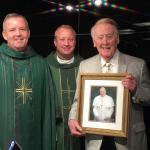Nathan Schneider writes in America:
I’ve only ever met one person of my generation—just barely young enough to be millennial—who claimed a calling to be a deacon. He was an Episcopalian. He was studying for a master of divinity degree at an eminent university more accustomed to producing graduates who aspire to lofty titles like chief executive officer and bishop. But he spoke about the deacon’s special role as a bridge between the hierarchy and the people, and about the humility and holiness of the calling. He spoke about it as a way to heal the church’s divisions. After a few minutes’ conversation in a doorway, he got me wondering for the first time about that calling for myself, though I was then still far from the age of 35, the minimum for a deacon in the Roman church. There was no shortage of times during those years, as a new convert to Catholicism, when I had been asked about becoming a priest; never had the diaconate come up.
How many of us have considered the diaconate for ourselves? Our Prayers of the Faithful often include hopes for priestly vocations, but how often for deacons? It has been half a century since the Second Vatican Council restored the permanent diaconate, including for married men, and now Pope Francis has established a commission to consider renewing the women’s diaconate. The possibility of this neglected order may soon concern a whole lot more of us.
He concludes:
Should you become a deacon? Maybe. I don’t know. Sit with that beautiful possibility. Let it nag you, if it will. There are so many good callings in the world and the church, yet this one has been overlooked for far too long. The pope wants us to study it with fresh eyes. But let’s do more than study. Let’s flood it—with our vocations, our voices and our prayers.
Photo: Deacon Greg Kandra












